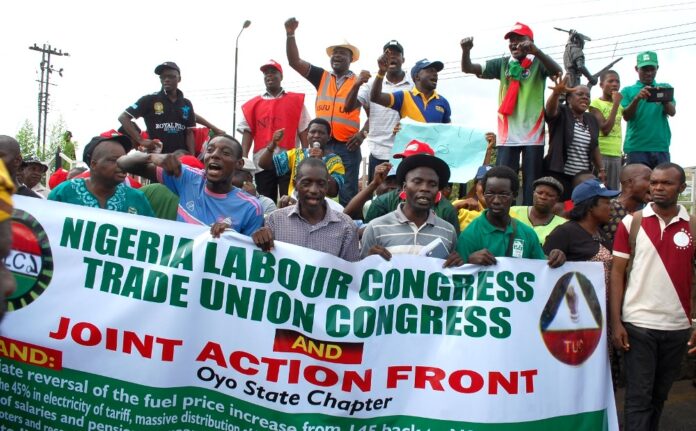NLC rejects ‘inadequate’ N8,000 palliative for the masses as federal lawmakers get N149m each
By Jeph Ajobaju, Chief Copy Editor
A mere fraction of N500 billion palliative to mitigate the effects of fuel subsidy removal is not enough to care for 12 million out of 133 million poor Nigerians who will get N8,000 per month for six months, while 469 federal lawmakers get N70 billion at N149 million each.
This is the view the Nigeria Labour Congress (NLC) and the Trade Union Congress (TUC), both of which insisted the provision is grossly inadequate to provide succour for workers grappling with rising prices of goods and services.
The National Assembly (NASS) approved the spending on Thursday.
The unions are demanding a 300 per cent pay rise to enable workers cope with the challenges imposed by a deteriorating economic condition made worse by subsidy removal.
The NLC said the amount voted for the masses is not enough to care for 133 million Nigerians living in multidimentional poverty, as documented by the National Bureau of Statistics (NBS).
The amount is “definitely not [enough]. We have over 125m Nigerians that are technically poor. To what extent can this cushion the effects of this economic hardship?” NLC National Treasurer Hakeem Ambali told The PUNCH.
__________________________________________________________________
Related articles:
Tinubu’s palliative will be looted like they did COVID-19 intervention, says Atiku
Sowore rubbishes Tinubu’s subsidy palliative scheme
Obi accuses Tinubu of bribing opposition Govs with board jobs
__________________________________________________________________
Demand for minimum wage review
To truly mitigate the effects of subsidy removal, Hakeem advocated for “minimum wage review of 300 per cent to all workers; granting licences to individuals for modular refineries to refine petrol locally, granting economic stimulus loan to SMEs at 15 per cent rate.
“The government should provide social benefits for aged and unemployed youths; agric loans to farmers and youths through the Agric Bank and community banks at single digit rate; provide alternative energy supply such as massive investment in solar power and Compressed Natural Gas to motorists.
“Fix the refineries; reverse the privatisation of electricity back to the state due to poor performance; execute metro rail line projects in all state capitals and reduction of school fees for students of tertiary institutions.”
The Nigerian Association of Chambers of Commerce, Industry, Mines and Agriculture (NACCIMA), Lagos Chamber of Commerce and Industry (LCCI), and Nigerian Economic Summit Group (NESG) also expressed reservations about the implementation of subsidy palliative, per reporting by The PUNCH.
Olusola Obadimu (NACCIMA Director General)
“The idea, in principle, is good. Of course, people expect some relief. It is in the statement that we issued. We said it clearly that palliatives would be a good idea. We argued for it.
“But talking about a specific figure is something we can’t do when we don’t know the scope. The concept is fine, but we need more information about the scope.”
Gabriel Idahosa (LCCI Deputy President)
“Whatever the President implements will not be sufficient to wipe out the impact of the two policies – subsidy removal and floating of the currency. So, it is going to be a partial effort to reduce, not eliminate, the effects of those policies.
“There is a basis to complain if the details come out and only the public (sector) gets to benefit from it, then everybody in the private sector has a reason to complain.
“We have to wait and see how the first set of palliatives will be designed, then we can complain legitimately if the private sector is not involved.”
Laoye Jaiyeola (NESG President)
“The clarity is that all of us are saying we must have palliative for the people affected. So if you are asking for palliative and the President cannot spend one naira without [NASS] approval; so, where can he get it if he doesn’t borrow it?
“Everyone said there must be palliative for the subsidy removal and the palliative means that government must address the shock of the people.
“You know you cannot spend without approval and you also know that we are in deficit; so, which other way can he get money if not borrow? So, he is following what the procedure says is legal.
“We support palliative but it should go to the ultimate consumer and not those who sit in one place and are spending money. Identify the people that are affected the most and give them the palliative.”













